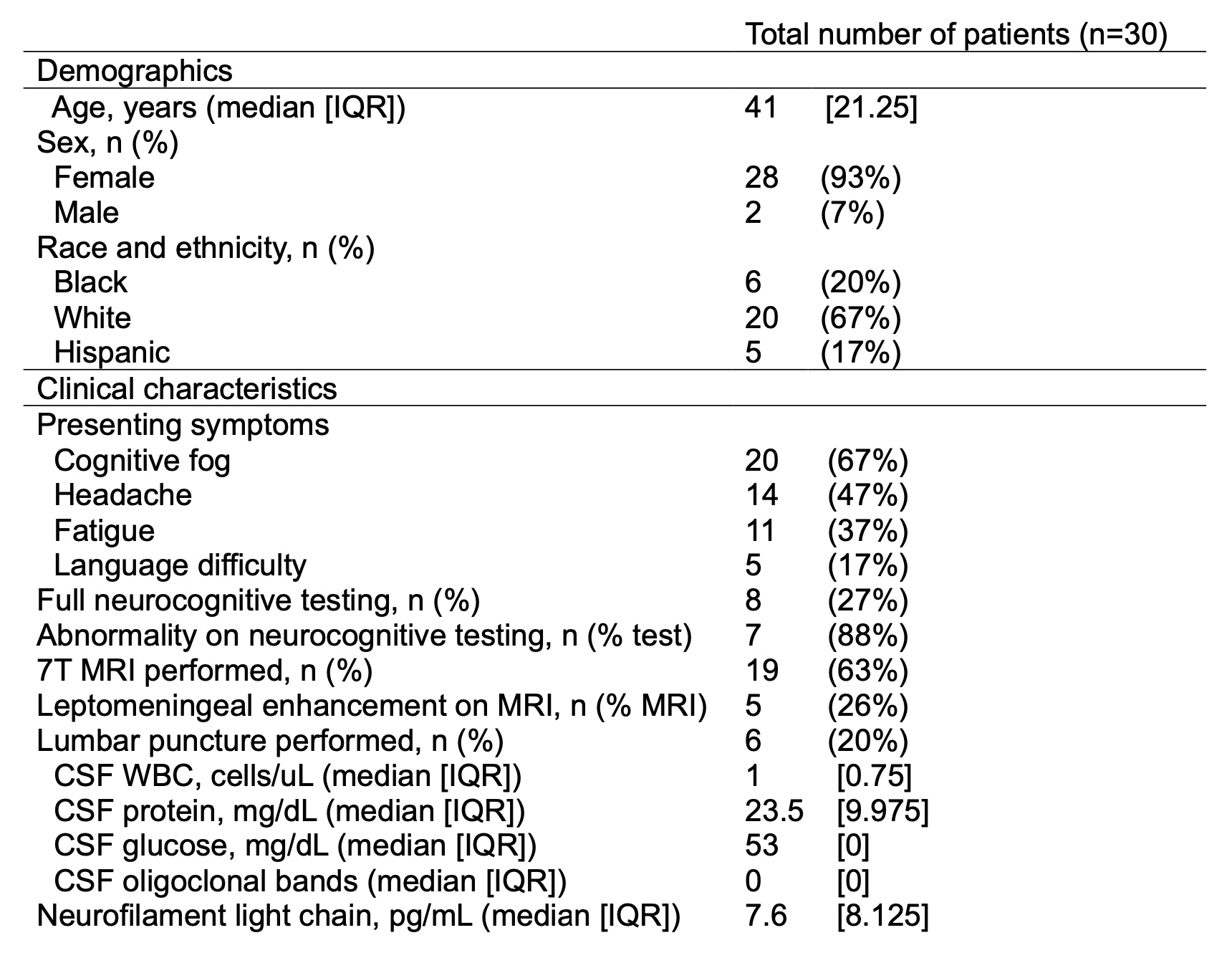Session Information
Session Type: Poster Session A
Session Time: 10:30AM-12:30PM
Background/Purpose: Neurological symptoms in lupus are common and occur in the majority of patients with SLE. Although neuropsychiatric lupus (NPSLE) can involve the entire nervous system, cognitive slowing and fatigue are more common and functionally limiting symptoms. There is currently no clear standardized, multidisciplinary approach to the evaluation and management of these patients. Further, there is an urgency to better understand the features and potential mechanisms of cognitive changes in patients with lupus to open new therapeutic avenues and standards of care.Our objective was to create a multidisciplinary Neuro-Lupus Program to comprehensively assess patients through advanced second-tier diagnostics, manage patients through multidisciplinary collaborations, and to build a clinical research database to investigate cognitive concerns in patients with SLE.
Methods: Patients with a diagnosis of SLE and any neurocognitive symptoms or concerns can be referred to the Neuro-Lupus Program. Patients are initially evaluated by a dedicated lupus neurologist, where they undergo a standardized neurologic history and exam. This is followed by referral for a full neurocognitive evaluation by a clinical psychologist and evaluation by a trained expert autoimmune disease psychiatrist. Patients then undergo advanced brain imaging using a high-resolution 7T MRI scan to evaluate for subtle inflammatory changes, including leptomeningeal enhancement, cortical atrophy, and brain lesions. Patients with abnormalities on MRI are evaluated further with CSF studies through a dedicated lumbar puncture clinic. We additionally have access to refer appropriate lupus patients for FDG PET-CT brain, TSPO-PET CT brain, vascular imaging, and EEG. For the clinical research arm, following patient consent, matched serum and CSF samples are added to a biorepository for future studies investigating cognitive changes in NPSLE.
Results: At our center, we have recruited and evaluated 30 patients with lupus and neurocognitive concerns in a 6-month period (Table 1). Full neurocognitive evaluation revealed previously undiagnosed mild cognitive impairment and dysexecutive function in a significant portion (88%) of patients presenting with “fatigue” or “cognitive fog”. Advanced imaging demonstrated previously undescribed leptomeningeal enhancement in 26% of patients with cognitive symptoms who underwent a 7T MRI brain scan. Despite the presence of significant cognitive changes and leptomeningeal enhancement, none of the CSF studies revealed an abnormally high white cell count or protein. Similarly, median neurofilament light chain (NfL) values, a serum biomarker for neuronal injury, was within the reference range.
Conclusion: In conclusion, our novel multidisciplinary Neuro-Lupus Program brings together neurologists, psychiatrists, rheumatologists, clinical psychologists, and radiologists to better support, evaluate, manage, and understand the complex but important cognitive impact of SLE on our patients. Future work will be aimed at leveraging our unique biobank and diagnostic studies to better understand the cellular and molecular pathways that may underly cognitive impairment in patients with lupus.
 Table 1. Demographics and clinical characteristics of patients with SLE referred to the Neuro-Lupus Program
Table 1. Demographics and clinical characteristics of patients with SLE referred to the Neuro-Lupus Program
To cite this abstract in AMA style:
Wilcox D, Baum M, Lebiedz S, Sullivan J, Naclerio M, Zurawski J, Glanz B, Bakshi R, Chitnis T, Bhattacharyya S, Costenbader K. Neurocognitive Complications of Lupus: A Multidisciplinary Program Model for Advanced Diagnostics, Management, and Clinical Research [abstract]. Arthritis Rheumatol. 2025; 77 (suppl 9). https://acrabstracts.org/abstract/neurocognitive-complications-of-lupus-a-multidisciplinary-program-model-for-advanced-diagnostics-management-and-clinical-research/. Accessed .« Back to ACR Convergence 2025
ACR Meeting Abstracts - https://acrabstracts.org/abstract/neurocognitive-complications-of-lupus-a-multidisciplinary-program-model-for-advanced-diagnostics-management-and-clinical-research/
